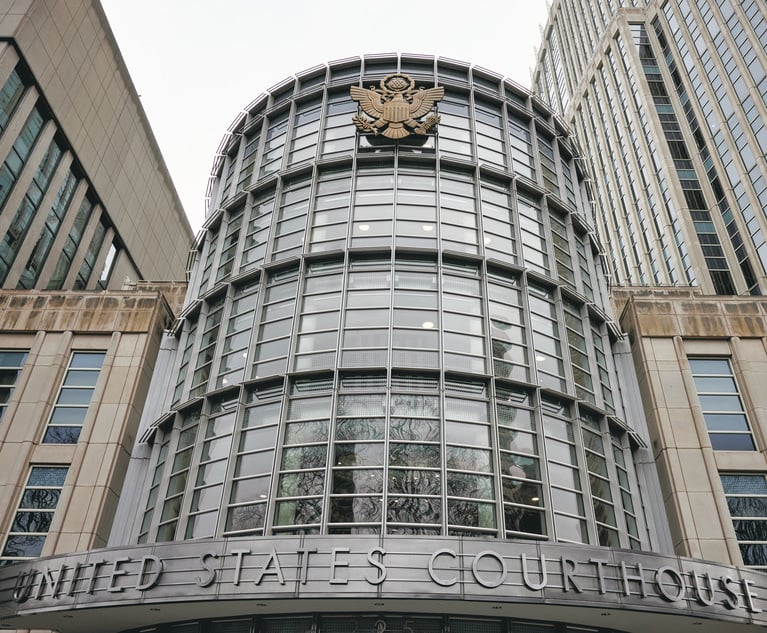2nd Circuit Upholds Convictions Over College Basketball Recruiting Fraud, Limiting Impact of 'Bridgegate' Reversals
On appeal, attorneys for the three defendants argued that the government failed to prove that they had intended to defraud the three universities—North Carolina State, Kansas and Louisville.
January 15, 2021 at 05:41 PM
5 minute read
 Amateur basketball league director Merl Code, left, former Adidas executive James Gatto, center, and business manager Christian Dawkins, right. Photo: AP/File
Amateur basketball league director Merl Code, left, former Adidas executive James Gatto, center, and business manager Christian Dawkins, right. Photo: AP/File The U.S. Court of Appeals for the Second Circuit on Friday upheld the convictions of three men found guilty in a pay-for-play scandal to funnel secret payments from Adidas to the families of top college-basketball recruits.
In a 58-page opinion that differentiated the case from New Jersey's infamous "Bridgegate" scandal, the panel ruled that Manhattan federal prosecutors had proved beyond a reasonable doubt that the defendants, James Gatto, Merl Code and Christian Dawkins, had "knowingly and intentionally" defrauded three Adidas-sponsored universities of property by hiding tens of thousands of dollars in payments to the players and their families.
The decision also rejected challenges to evidentiary rulings and instructions that a Manhattan federal judge put to the jury at trial.
A federal jury in 2018 convicted the men on wire fraud and conspiracy charges and sentenced them each to multiple months for their role in the scandal, which funneled the illicit payments through AAU basketball teams in violation of National Collegiate Athletic Association rules. Prosecutors had argued that the scheme had withheld information from the universities and stripped the schools of financial aid funds that could have gone to other students.
U.S. District Judge Lewis A. Kaplan of the Southern District of New York sentenced Gatto, the head of global sports marketing for Adidas, to nine months in federal prison. Code, a former Adidas consultant who worked for competitor Nike Inc. at the time, and Dawkins, an aspiring sports agent, each received six months in prison.
On appeal, attorneys for the three defendants argued that the government failed to prove that they had intended to defraud the three universities—North Carolina State, Kansas and Louisville.
Instead, they said, their clients meant to help the schools by bringing them highly sought-after recruits to bolster their winning basketball programs. They also argued that under-the-table payments like the ones they helped facilitate were widespread in college sports, and many college coaches actually endorsed the practice.
The panel on Friday acknowledged that men's basketball was a major source of revenue at some major universities, "but we need not be drawn into the debate over the extent to which college sports is a business."
"Instead, our task is to determine whether the government proved beyond a reasonable doubt that defendants knowingly and intentionally engaged in a scheme, through the use of wires, to defraud the universities of property, i.e., financial aid that they could have given to other students," Second Circuit Judge Denny Chin wrote in a majority opinion. "We conclude that the government did."
Chin noted that the case diverged in significant ways from the U.S. Supreme Court's unanimous ruling last year in the case Kelly v. United States, which overturned federal fraud convictions for two New Jersey officials who engineered a massive traffic gridlock on the George Washington Bridge in an act of political retribution aimed at a local mayor.
In the so-called "Bridgegate" case, Chin said, retaliation—not property—was the object of the alleged fraudulent scheme, and the governmental costs of sorting out the mess were merely an "incidental byproduct of the scheme."
"This case is different from Kelly," Chin wrote. "Here, the loss of property—the universities' funds set aside for financial aid—was at the heart of defendants' scheme."
For instance, the defendants had concealed the payments in order to get the schools to give the recruits financial aid, the opinion explained.
"Importantly, the scheme depended on the universities awarding ineligible student-athletes athletic-based aid; without the aid, the recruits would have gone elsewhere," Chin wrote. "And if the recruits' ineligibility had been discovered by the schools, the scheme would have failed."
The ruling came over the partial objection of Judge Gerard E. Lynch, who took issue with Kaplan's decision to present certain evidence to the jury. Lynch did, however, agree that the evidence was "sufficient to support the jury's verdict and that the jury was properly instructed as to the governing law."
U.S. District Judge Paul A. Engelmayer of the Southern District of New York, who sat by designation, joined Chin's majority ruling.
Attorneys for the defendants did not immediately respond Friday afternoon to requests for comment.
A spokesman for the Manhattan U.S. Attorney's Office declined to comment.
Read More:
This content has been archived. It is available through our partners, LexisNexis® and Bloomberg Law.
To view this content, please continue to their sites.
Not a Lexis Subscriber?
Subscribe Now
Not a Bloomberg Law Subscriber?
Subscribe Now
NOT FOR REPRINT
© 2025 ALM Global, LLC, All Rights Reserved. Request academic re-use from www.copyright.com. All other uses, submit a request to [email protected]. For more information visit Asset & Logo Licensing.
You Might Like
View All
The Met Hires GC of Elite University as Next Legal Chief

NY Appellate Panel Cites Student's Disciplinary History While Sending Negligence Claim Against School District to Trial

'No Evidence'?: Big Law Firms Defend Academic Publishers in EDNY Antitrust Case
3 minute read
'Substantive Deficiencies': Judge Grants Big Law Motion Dismissing Ivy League Price-Fixing Claims
3 minute readTrending Stories
Who Got The Work
J. Brugh Lower of Gibbons has entered an appearance for industrial equipment supplier Devco Corporation in a pending trademark infringement lawsuit. The suit, accusing the defendant of selling knock-off Graco products, was filed Dec. 18 in New Jersey District Court by Rivkin Radler on behalf of Graco Inc. and Graco Minnesota. The case, assigned to U.S. District Judge Zahid N. Quraishi, is 3:24-cv-11294, Graco Inc. et al v. Devco Corporation.
Who Got The Work
Rebecca Maller-Stein and Kent A. Yalowitz of Arnold & Porter Kaye Scholer have entered their appearances for Hanaco Venture Capital and its executives, Lior Prosor and David Frankel, in a pending securities lawsuit. The action, filed on Dec. 24 in New York Southern District Court by Zell, Aron & Co. on behalf of Goldeneye Advisors, accuses the defendants of negligently and fraudulently managing the plaintiff's $1 million investment. The case, assigned to U.S. District Judge Vernon S. Broderick, is 1:24-cv-09918, Goldeneye Advisors, LLC v. Hanaco Venture Capital, Ltd. et al.
Who Got The Work
Attorneys from A&O Shearman has stepped in as defense counsel for Toronto-Dominion Bank and other defendants in a pending securities class action. The suit, filed Dec. 11 in New York Southern District Court by Bleichmar Fonti & Auld, accuses the defendants of concealing the bank's 'pervasive' deficiencies in regards to its compliance with the Bank Secrecy Act and the quality of its anti-money laundering controls. The case, assigned to U.S. District Judge Arun Subramanian, is 1:24-cv-09445, Gonzalez v. The Toronto-Dominion Bank et al.
Who Got The Work
Crown Castle International, a Pennsylvania company providing shared communications infrastructure, has turned to Luke D. Wolf of Gordon Rees Scully Mansukhani to fend off a pending breach-of-contract lawsuit. The court action, filed Nov. 25 in Michigan Eastern District Court by Hooper Hathaway PC on behalf of The Town Residences LLC, accuses Crown Castle of failing to transfer approximately $30,000 in utility payments from T-Mobile in breach of a roof-top lease and assignment agreement. The case, assigned to U.S. District Judge Susan K. Declercq, is 2:24-cv-13131, The Town Residences LLC v. T-Mobile US, Inc. et al.
Who Got The Work
Wilfred P. Coronato and Daniel M. Schwartz of McCarter & English have stepped in as defense counsel to Electrolux Home Products Inc. in a pending product liability lawsuit. The court action, filed Nov. 26 in New York Eastern District Court by Poulos Lopiccolo PC and Nagel Rice LLP on behalf of David Stern, alleges that the defendant's refrigerators’ drawers and shelving repeatedly break and fall apart within months after purchase. The case, assigned to U.S. District Judge Joan M. Azrack, is 2:24-cv-08204, Stern v. Electrolux Home Products, Inc.
Featured Firms
Law Offices of Gary Martin Hays & Associates, P.C.
(470) 294-1674
Law Offices of Mark E. Salomone
(857) 444-6468
Smith & Hassler
(713) 739-1250






